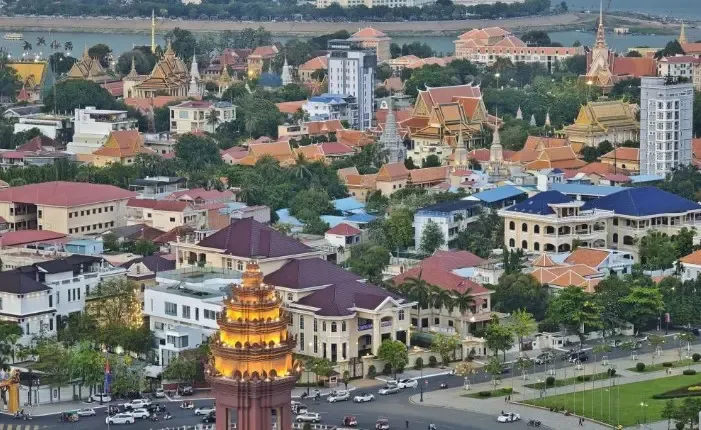How is IMF Forecasting Slow Growth for Cambodia?

Synopsis
Key Takeaways
- Projected economic growth of 4.8% in 2025.
- Challenges include export volatility and declining remittances.
- U.S. tariffs may impact export earnings.
- Structural reforms are essential for long-term stability.
- ADB's investment aims to enhance financial capacity.
Phnom Penh, Nov 26 (NationPress) The International Monetary Fund (IMF) has forecasted a slowdown in Cambodia's economic growth, projecting it to decline to 4.8 percent in 2025 and 4 percent in 2026. This decline is attributed to factors such as export volatility, diminishing remittances, a downturn in tourism, and weak domestic demand.
In 2024, Cambodia's growth was recorded at 6 percent. However, a combination of challenges—including trade disruptions, border tensions, and sluggish credit growth—has unveiled the economy's weaknesses, with signs of a slowdown becoming apparent in the latter half of 2025, as noted in an IMF press release.
The IMF stated, "The downward revision is a result of remittance losses and a slowdown in tourism, which are likely to hinder domestic demand." They further explained that tariff impacts will reduce export revenues as manufacturers grapple with margin pressures.
On August 1, the United States implemented a 19 percent tariff on all goods imported from Cambodia, according to reports from Xinhua news agency.
The IMF emphasized the necessity for prudent fiscal and monetary policies alongside structural reforms to maintain stability and enhance resilience. It also suggested that immediate measures are needed to mitigate external shocks while establishing a foundation for long-term competitiveness.
Inflation in Cambodia is expected to see a modest rise in 2025 before stabilizing in 2026.
Earlier this week, the Asian Development Bank (ADB) approved a policy-based loan of 50 million US dollars aimed at bolstering Cambodia's financial sector and digital infrastructure.
This investment is set to support both banking and non-banking entities, as well as enhance digital finance infrastructure and sustainable finance capabilities, as stated in an ADB press release.
Anthony Gill, the ADB's acting country director for Cambodia, commented, "This investment will help strengthen the financial sector, foster resilient growth, expand financial inclusion, and unlock the potential of the private sector."
While there have been significant advancements in Cambodia's financial sector, the release pointed out that further development is necessary to fully realize its potential.
The first phase of the investment program will focus on improving the regulatory environment, ensuring financial stability, enhancing market depth, and protecting consumers, in addition to developing strategic plans for financial technology, regulatory frameworks for digital assets and cryptocurrencies, and peer-to-peer financing.









